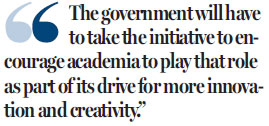Time to think outside the box when promoting innovation
Updated: 2016-03-03 07:52
By Peter Liang(HK Edition)
|
|||||||||
In coordination with a major government policy thrust, Financial Secretary John Tsang Chun-wah has proposed pumping considerable resources into promoting innovation and creativity in his Budget for the fiscal year beginning April 1.
Apparently, Hong Kong's free market environment and its many unique advantages are not sufficient enough to propel it into the forefront of the technology hub in the region. Instead, it is widely seen to be lagging behind other regional economies, particularly South Korea, Taiwan and Singapore, in innovation and entrepreneurship.
Many economists have credited the success of those economies in innovation to massive government subsidies in the form of direct funding, tax and other incentives and land grants. The question is whether these same efforts can achieve the desired results in an economy like Hong Kong that has few, or no, manufacturing industries.
In his Budget, Tsang proposed to allocate a special fund to help rebuild Hong Kong's reputation as a fashion capital in the region. In the 1970s and early 1980s, Hong Kong's fashion design was well recognized around the world. That was also the time when Hong Kong was one of the world's major garment exporters.
Unable to compete with neighboring manufacturing bases on cost, Hong Kong garment makers had to move up-market, bringing them into direct competition with manufacturers of higher-value-added products from Italy and other developed economies. Instead of cutting costs, Hong Kong garment makers turned to design and quality to increase their profit margins.
As patrons of the many budding local design talents, manufacturers helped with feedback on the latest market trends and knowledge in cost control.
At that time, the government-sponsored Hong Kong Trade Development Council (HKTDC) had achieved significant results in promoting Hong Kong-designed fashions in various overseas markets. The annual Hong Kong fashion gala, arranged by the HKTDC, used to be a major event that attracted buyers from around the world.
To be sure, there is no shortage of well-trained and enthusiastic fashion designers in Hong Kong. But without the sponsorship and support of a thriving garment manufacturing industry, a more ambitious program than government subsidies is needed to reestablish Hong Kong's reputation as a fashion design center. It is hoped that the HKTDC, to which the task is entrusted by Tsang, can produce a workable strategy that can win public support when there is a need for additional funding.
In its struggle for innovation and creativity, Hong Kong is constrained by a domestic market which is too small for entrepreneurs to test their products with the hope of achieving a sales volume that can provide funding for overseas expansion. This is a limitation that cannot be overcome by any form of government intervention. What the government has done with some success is to build the facilities and create a business environment that can attract foreign technology companies to establish their offshore product development centers in Hong Kong. To enhance Hong Kong's attractiveness as a product development hub in the region, Tsang has proposed additional funding to expand the existing facilities in various locations.
Some economists have urged the government to match the offers by some other regional economies in competing for foreign investors in information technology by introducing tax incentives. But such incentives are not going to make much difference to potential foreign investors who have taken into account Hong Kong's already low and simple tax regime together with other advantages, including the rule of law, an efficient civil service and the free flow of information. Of course, Hong Kong can enhance its competitiveness by offering greater protection of intellectual property rights (IPR). For that reason, the proposed amendment to the IPR law, pending lawmakers' approval, is of vital importance to the development of the technology industry.
Availability of talent is another major factor in competing for foreign investment. This is particularly true for the technology enterprises that thrive on trendsetting rather than producing prowess. The question is whether the universities and technical colleges in Hong Kong are producing the right people for this industry.
The answer does not sound so encouraging. Universities in Hong Kong are better known for producing able administrators than original thinkers.
The universities themselves are not known for producing ideas and solutions relevant to Hong Kong. The drive for innovation cannot be complete without the active participation of the universities which can provide key research support. Such support must be closely linked to the marketplace.
As Johnny Chan, a professor at City University of Hong Kong, said last year at a forum organized by the British Council, academia can play the central role in linking government, industry and society. "This is a distinct advantage for universities," he said.
The government will have to take the initiative to encourage academia to play that role as part of its drive for more innovation and creativity.
The author is a veteran current affairs commentator.

(HK Edition 03/03/2016 page10)